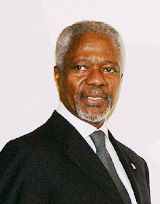Annan pushes UN Security Council to act on Sudan’s issues
By NICK WADHAMS, Associated Press writer
UNITED NATIONS, Mar 7, 2005 (AP) — U.N. Secretary-General Kofi Annan on Monday urged the Security Council to move faster to confront the crisis in Sudan and called for more international troops in the country’s violence-wracked Darfur region.
 Annan had summoned council ambassadors in hopes that they will break a deadlock over his proposal to send 10,000 U.N. peacekeepers to monitor a peace accord ending years of civil war between the government and southern rebels.
Annan had summoned council ambassadors in hopes that they will break a deadlock over his proposal to send 10,000 U.N. peacekeepers to monitor a peace accord ending years of civil war between the government and southern rebels.
Annan hopes to use that resolution focusing on the end of the north-south conflict to ease violence in the western Darfur region, described as the world’s worst humanitarian crisis. In early February, a U.N. panel found evidence of crimes against humanity in Darfur, but council members still haven’t been able to agree on action.
“There have been a lot of efforts on the humanitarian side, and … on the security side, which go in the right direction. But they are not enough,” Annan said. “We keep getting reports which show that the killing and raping and burning are still going on.”
The Darfur conflict has forced more than 2 million people to flee their homes and left more than 70,000 dead, mainly from disease and hunger.
In a statement released after the hour-long meeting, Annan said it was possible that U.N. peacekeepers could complement African Union troops now in Darfur but he wanted the 53-nation African bloc to play the lead role. The African Union has deployed about 1,800 soldiers of an expected 4,000-strong force.
Annan said he was “pleased” to hear from the council during Monday’s meeting that members hoped for a Sudan resolution this week that would include a mechanism for holding people accountable for crimes there.
But several Security Council ambassadors said a resolution didn’t appear likely this week and no such mechanism has been agreed on. The accountability issue has been a key source of contention within the council, along with whether to implement sanctions.
A dozen of the 15 council members want to refer suspects to the world’s first permanent war crimes tribunal, the International Criminal Court. The U.S., an opponent of that body, wants them tried in a new tribunal in Tanzania, an idea which council diplomats say has little support.
Greece’s U.N. Ambassador Adamantios Vassilakis defended the council’s pace despite criticism it is moving too slowly, saying unanimity was crucial. But he acknowledged that the sides appeared no closer than before on coming up with a way to bring war crimes suspects to justice.
“How it’s going to be solved, don’t ask me, I cannot guess,” he said.
Diplomats said it’s now possible that the Security Council will try to forge a resolution by the end of this week that would send peacekeepers and impose sanctions, but leave the issue of accountability for later.
“It is possible, I wouldn’t say that it is absolutely certain but it is possible,” said Brazil’s U.N. Ambassador Ronaldo Mota Sardenberg, the Security Council president for March. “There might be a second draft on impunity.”
The U.S. circulated a draft resolution last week proposing a 45-day timeframe to come up with a mechanism for bringing perpetrators of war crimes in Sudan to justice, diplomats said. But the Americans later issued another draft that didn’t mention a timeframe and declared the council’s determination to try the suspects.
That early call led the New York-based rights group Human Rights Watch to accuse the United States of delaying a solution on Darfur to achieve its own political ends, an idea that U.S. Mission spokesman Richard Grenell rejected. He said the mention of 45 days had been misinterpreted.
“The United States is not seeking to delay the accountability at all,” Grenell said. “To the contrary, we’ve been the one that’s leading the way in trying to enact immediate sanctions and make sure that those who committed these atrocities are dealt with as soon as possible.”
Several ambassadors and Annan also said a representative from the U.N. will join officials from the African Union, the European Union and the United States on an assessment mission to Darfur later this week to recommend ways to help the African Union presence there.
Despite continued disagreements, ambassadors said they recognized the need for quick action and expected a resolution soon.
“We all understand that we have to move faster,” Russia’s U.N. Ambassador Andrey Denisov said. “So the main reason for that meeting was to try to speed up.”
